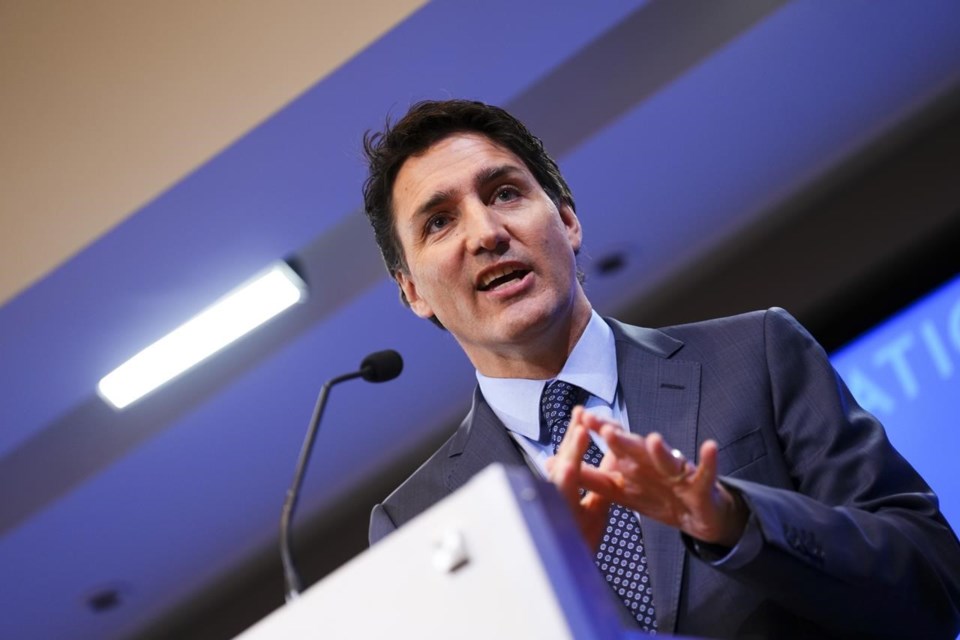WASHINGTON — Indigenous leaders in Canada and the U.S. are turning up the pressure on Ottawa for an investigation of toxic mining runoff from B.C., despite high-level bilateral promises of an agreement by this summer to "reduce and mitigate" its impact.
Tribal and First Nations leaders were in Washington, D.C., last week to plead their case at meetings of the International Joint Commission, the body that oversees the 114-year-old treaty governing waters that straddle the Canada-U.S. border.
They said they are encouraged — but not convinced — by the commitment Prime Minister Justin Trudeau and President Joe Biden made in March to reach an agreement in principle by summer to address pollution in the Elk-Kootenai watershed.
"Mining pollution across our homelands jeopardizes our culture, our food security and most importantly the health of (all living things) for which we are responsible," said Kathryn Teneese, chair of the Ktunaxa Nation Council in the B.C. Interior.
"We need more than a soft commitment to agree to a solution in principle. The Kootenay River deserves, and the Ktunaxa people expect, clear federal action from the Canada-U.S. bilateral negotiations."
The Elk and Kootenay rivers, spelled Kootenai in the U.S., feed a watershed that lies within the transboundary Columbia River basin, which has been the subject of ongoing treaty discussions since 2018.
Canada's reluctance to agree to an IJC investigation under the Boundary Waters Treaty of 1909, known as a joint reference, has bewildered and frustrated tribal and Indigenous leaders and environmentalists for years.
But on Friday, the prime minister defended his agreement with Biden and predicted it would ultimately prove more successful than a reference.
"We believe that there are processes that are being followed right now that have a better chance of getting to a resolution," Trudeau said during a news conference in New York City.
Communities in B.C., Washington state, Idaho and Montana have been contending for more than a decade with selenium and other toxins leaching into their watershed from coal mining operations in the province's Elk Valley.
Following Biden's meetings with Trudeau in Ottawa in March, the two leaders vowed to work toward "an agreement in principle by this summer to reduce and mitigate the impacts of water pollution in the Elk-Kootenai watershed."
Any forthcoming agreement on pollution from B.C.'s Elk Valley would be in partnership with tribes and Indigenous Peoples from both countries, and would aim to "protect the people and species that depend on this vital river system," their joint statement said.
The principal mining player in the region, Teck Resources, has already spent more than $1.2 billion in an effort to fix the problem, with plans for $750 million more over the next two years.
The company's strategy includes the Elk Valley Water Quality Plan, developed with help from Indigenous stakeholders, the U.S. Environmental Protection Agency, the state government in Montana, the B.C. government and Ottawa.
Teck has described the plan as one of the largest and most collaborative water quality management and monitoring programs in the world, and insists its water treatment and mitigation efforts have already proven effective.
But Indigenous leaders remain deeply skeptical, insisting that toxicity levels still exceed acceptable levels.
In a letter last month to both Trudeau and B.C. Premier David Eby, Teneese and 10 other signatories noted their obligations under the boundary waters treaty, as well as the United Nations Declaration on the Rights of Indigenous Peoples.
"Canada and British Columbia's recklessness endangers our waters, territories and cultural survival," they wrote.
"Canada and British Columbia are investing in large-scale mining expansions that would further damage our traditional territories and way of life, despite purported commitments from both your governments to honour our sovereign rights and the planet."
The letter laid out a comprehensive list of demands, and put agreeing to a joint reference — something the U.S. State Department has already said it supports — right at the top of the list.
The group calls for consultations with Indigenous groups on future mining projects and a moratorium on permits until that mechanism is in place, as well as a ban on upstream mine waste dams and tailings ponds.
It also wants the commission to create more international "watershed boards" comprising local stakeholders along the Canada-U.S. border, with Indigenous and tribal leaders as members, to monitor the transboundary impacts of mining operations.
As the IJC meetings got underway, newly elected Alaska Rep. Mary Peltola joined the ranks of U.S. lawmakers who want to see both countries get more serious about the impact of B.C. mining operations on their shared watersheds.
Peltola called on the Biden administration to initiate a watershed board for a series of rivers along the state's southeastern border with B.C. to monitor "the potential impacts of widespread Canadian mineral exploration and development."
Peltola said she's particularly concerned about shared wild salmon habitats. Mining claims have already been staked along 90 per cent of the B.C. side of one of the rivers, the Unuk, according to Salmon Beyond Borders, an Alaska-based conservation group.
"This is the best way to ensure that Alaskan communities and tribes downstream from potential and existing mining sites in B.C. can raise their concerns and participate in an equitable dialogue between our two nations," she said in a statement.
This report by The Canadian Press was first published May 1, 2023.
James McCarten, The Canadian Press



